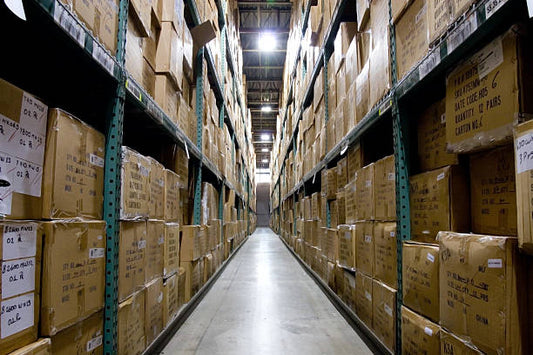Introduction: The Ongoing Mystery Box Trend
Mystery Boxes have captured global attention. They promise surprise contents that could be anything from small novelties to high-value electronics. The excitement is fueled by countless unboxing videos on YouTube and TikTok, where people hope to strike gold.
Yet for many buyers, the experience raises questions. Are these boxes really a good deal? What’s inside them? And how do they end up on the market in the first place?
As you may already know, we at Liquidation Stock were interviewed by ARD’s Marktcheck a few months ago as part of their documentary “Mystery Boxen – Schnäppchen oder Schrott?”. In this article, we summarize the investigation, share our own input from the interview, and look at the bigger picture of the Mystery Box business.
What Exactly Are Mystery Boxes?
A Mystery Box is a sealed parcel sold with the promise of surprise. It could contain electronics, lifestyle items, household goods — or simply everyday products.
Typical examples include:
- Vending machine boxes (low-cost, impulse buys)
- eBay and online offers (medium price, usually €20–€100)
- Retailer branded boxes (from shops like Media Markt)
The attraction lies in the gamble: customers hope the contents exceed the purchase price.
Marktcheck’s Investigation: Putting Mystery Boxes to the Test
The Marktcheck team set out to test Mystery Boxes by purchasing them from several sources.
- Vending machine (€10): contained only a water bottle — disappointing for the price.
- eBay (€50): filled with mixed items like a French press, weights, and sanitizer. The value looked okay, but practicality was questionable.
- Media Markt (€100): included retail leftovers. The products were new, but some were outdated models or slow movers.
What They Found
The investigation showed that while some boxes technically delivered value, many contained products that were hard to use or resell. For most buyers, the experience depended heavily on luck.
Our Segment in the Report (6:50 – 8:32)
At 6:50 minutes, the program turned to us at Liquidation Stock to explain the supply chain.
We highlighted three key points:
-
Where the goods come from
Mystery Box contents are usually drawn from customer returns, shelf-warmers, or liquidation stock. These are items retailers move out of primary sales channels. -
Inspection is limited
Many items are sold without being checked in detail, so defects or outdated goods may appear. -
Margins for sellers
The business model allows sellers to earn €6–7 profit per €10 box, mixing one or two attractive products with several low-value fillers.
We also cautioned that while many wholesalers act responsibly, there are also less transparent sellers. Buyers should always consider who is behind the box.
Are Amazon Mystery Boxes Legitimate?
Q: Are Amazon Mystery Boxes real?
According to Marktcheck, Amazon itself does not sell Mystery Boxes. Instead, independent resellers market them using the “Amazon” name. These boxes usually contain returns or mixed pallets sourced elsewhere.
The term “Amazon Mystery Box” is therefore a marketing label, not an official product.
Are the Items New or Used?
Q: Do Mystery Boxes contain new products?
Based on the investigation and industry insight:
- Many items are customer returns (sometimes opened or lightly used).
- Others are overstock or unsold items.
- Some boxes include imported low-cost goods added to increase quantity.
It is possible to find new items, but there’s no guarantee.
Where Do the “Best” Mystery Boxes Come From?
Q: Where should I buy Mystery Boxes?
Marktcheck’s research showed that quality varies widely. Retailers like Media Markt may provide higher-value goods, but even these boxes can include outdated stock. Online sellers on platforms like eBay or independent websites range from reliable to risky.
The key is transparency: customers have the best experience with sellers who clearly explain where the products come from and what categories to expect.
What Is an Amazon Mystery Box?
Q: What exactly is meant by Amazon Mystery Box?
The term generally refers to boxes advertised as containing items from Amazon returns. In reality, these are usually put together by third-party resellers who buy liquidation pallets or returns in bulk.
So while the goods may have once been sold on Amazon, the Mystery Box itself is not an Amazon-issued product.
The Bigger Picture: Returns and Surplus Stock
Mystery Boxes are only one expression of the larger returns and surplus stock industry.
Every year, millions of items are sent back to retailers. To recover costs, companies pass these on to wholesalers, who repackage and resell them in bulk. Sometimes, that chain ends in Mystery Boxes marketed to consumers.
Some sellers frame this as part of the circular economy, highlighting the idea of extending product life. While sustainability can play a role, in practice much of this business is about balancing cost recovery and resale opportunities.
Consumer Rights and Protections
One important aspect discussed in the Marktcheck program was consumer rights:
- Right of withdrawal: only applies to online purchases, not vending machines.
- Defective goods: customers may complain or request replacements.
- Return costs: usually paid by the customer, which discourages returns for small-value goods.
This means buyers should understand their rights before purchasing, especially when ordering online.
Balanced Perspective: Fun or Frustration?
So what does all of this mean for consumers?
The Marktcheck investigation found that many boxes contain a mix of practical and less useful products. For some buyers, the surprise element is fun and worth the price. For others, the lack of control over contents is frustrating.
From our perspective at Liquidation Stock, the model works best when sellers are transparent and customers know what to expect. In those cases, Mystery Boxes can provide genuine entertainment value and sometimes even good deals.
Conclusion: A Matter of Transparency
The Mystery Box trend is unlikely to fade anytime soon. It combines entertainment with commerce in a way that appeals to many consumers.
- Marktcheck’s role was to show both the highs and the lows of the experience.
- Our contribution explained where the products come from and why quality can vary.
Ultimately, the value of a Mystery Box depends less on luck and more on the seller’s integrity. Boxes from trustworthy, transparent providers can be enjoyable and worthwhile. Buyers should simply remember that surprises can go either way.
Support for Your Mystery Box Business
If you want to start a Mystery Box business — or already run one and want to ensure it’s set up for long-term success — join our free B2B membership today.
- Access top-quality products
- Gain insider knowledge
- Get one-on-one assistance from industry specialists dedicated to helping your business grow
Register for free B2B membership here:
https://liquidationstock.com/pages/apply-for-premium
Or get in contact directly on WhatsApp:
https://wa.me/4917647193166
📺 You can watch the full ARD report here: Mystery Boxen – Schnäppchen oder Schrott? (ARD Mediathek)
or watch the interview on youtube below









